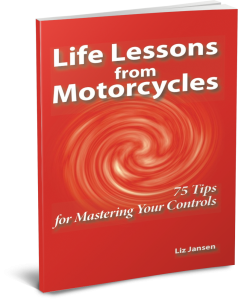10 Ways to Make Better Decisions
by Liz Jansen
While you don’t come with throttle, clutch, or brakes, there are direct parallels and lessons on how to manage your power and learn to make better decisions through motorcycle riding.
Excerpt from Life Lessons from Motorcycles—75 Tips for Mastering Your Controls.
 A motorcycle responds to direction based on fact. It doesn’t interpret, inject emotion, or argue. Inputs that affect performance come not only from the operator but also from the road and the immediate environment.
A motorcycle responds to direction based on fact. It doesn’t interpret, inject emotion, or argue. Inputs that affect performance come not only from the operator but also from the road and the immediate environment.
Consequently, when all inputs have been considered, the operator can make the best decision on how best to apply throttle, brakes, clutch, and gears.
Apply the same principles to your life.
- Do your homework. Even the decision to learn how to ride is best made when you’re clear on skill requirements, appropriate riding gear, how to purchase your first motorcycle, motorcycle upkeep, and, of course, the risk. The more prepared you are in any situation, the greater the likelihood of making a wise decision.
- Life-long learning. Take a skills course every season, ideally at the beginning of the season. Skills get rusty if they’re not used, and there’s always something new to learn that can make you a better rider, colleague, or partner.
- Surround yourself with the right people. While you must always ride your own ride, you’ll increase your own skills by riding with others who are more proficient than you are. Hang around with people who will inspire you to grow, learn, and embrace life.
- Heed road conditions. Like the physical road you travel, your life Road can be smooth and paved, full of twists and turns, strewn with potholes, or even under construction. You navigate safely by responding appropriately to conditions. While conditions are out of your control, how you interpret and respond to them is up to you.
- Observe signs. Posted signs tell you to slow down, speed up, merge, and detour. You stay safe by adjusting your speed and direction accordingly. Life signs can be less obvious, but they’re there and they guide you in making choices. Intuition is always there and always right.
- Adjust to traffic. Whatever situation you find yourself in, whether it’s at work or at home, it has to be a fit for you. Is it casual and stable or fast-paced and rapidly changing? You shouldn’t be on a road where the traffic is traveling in a way you’re not happy with. Before you put yourself in a place where you know you’re not going to be happy, assess whether you have the skills, motivation, and energy to go there. More importantly, ask why you’d even go there. You might find yourself picking a different route.
- Deal with congestion. You share the highway with other vehicles, and you share your life with other people. They’re always coming and going. While their actions are outside of your control, they influence the situation you’re riding or living in and the choices you make. You can still stay focused on your own destination, but the journey there can be different than you expected.
- Mind the weather. Weather is another input you can’t control. You can, however, choose how you prepare for it and what responses you make to it. Sunshine and blue skies mean good visibility and clear sailing. If a storm blows up or darkness falls, you adjust your momentum. The environment around you is dynamic and unpredictable. Enjoy the blue skies and know how to deal with storms.
- Stay healthy. Regular inspections and preventative maintenance keep your bike in top shape. They boost confidence that it will respond as you expect it to. You owe yourself the same respect by honoring who you are and caring for your body, mind, and spirit.
 Pay attention. In the end, if you’re not aware of what’s going on around you, you’re not making the best choices. You can easily be sidetracked into peril by emotions, thoughts, fear, or worry.
Pay attention. In the end, if you’re not aware of what’s going on around you, you’re not making the best choices. You can easily be sidetracked into peril by emotions, thoughts, fear, or worry.
While these don’t ever go away completely, you can control how you respond to them. Stay focused on what you can do. That’s how you’ll make a difference.
Review this list in the context of your own life’s journey. As you do, identify the inputs in your environment and reflect on how you’re responding to them. It may be time to pay more attention to them and adjust your direction accordingly.
Purchase the entire ebook Life Lessons from Motorcycles—75 Tips for Mastering Your Controls available for any e-reader. $2.99.
photo credit: A crossroad via photopin (license)
[ois skin=”3″]
